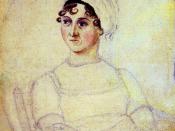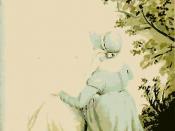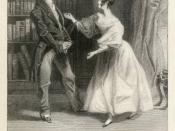Good afternoon teachers and students,
"So we beat on, boats against the current, borne back ceaselessly into the past" The concluding words of Fitzgerald's novel, The Great Gatsby, illustrate our reluctance to move beyond the past. However, the novel urges us to accept change, as our rejection will lead to a failure to deal with life. We also need to initiate change in order to attain contentment as suggested by Miroslav Holub's "The Door" and Jane Austen's "Pride and Prejudice".
"Go and open the door". The imperative command in Miroslav Holub's poem epitomises "The Door"'s primary theme: we need to venture outside our comfort zone and experience new things. The purpose of the poem is to inspire the reader to do this. Holub effectively makes use of various language features to convey his message. The repetition of "Go and open the door" allows Holub to emphasise the vital need for change.
The word "maybe" is also repeated to stress that you will never know what is behind the door unless you open it. The metaphor of "opening a door" shows that we must open ourselves up and make a change.
The poem illustrates the vast realm of possibilities change can bring through its unique structure: in each stanza there is a command followed by a possible consequence. These consequences are metaphorical images that range from "a Magic city", to a "hollow wind". Holub tells us that even if there are ominous things outside, you should still open the door for no matter what, "at least there'll be a draught". This is an important theme in the poem: there is never a void in one's life. As long as we open the door, there'll always be change. Change is an internal process, so one must take it on herself...


